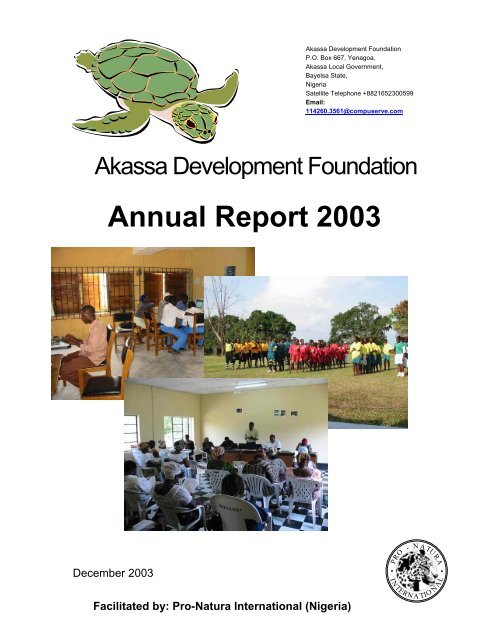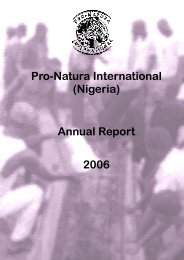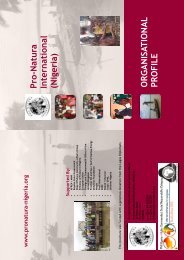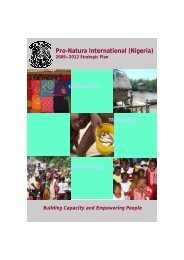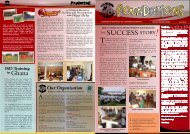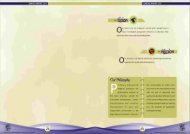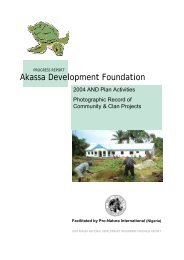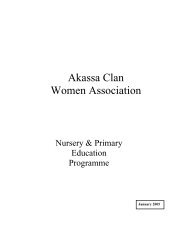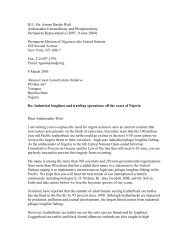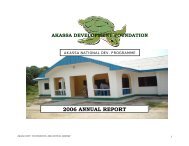2003 Annual report (707 kb pdf) - pro natura international (nigeria)
2003 Annual report (707 kb pdf) - pro natura international (nigeria)
2003 Annual report (707 kb pdf) - pro natura international (nigeria)
You also want an ePaper? Increase the reach of your titles
YUMPU automatically turns print PDFs into web optimized ePapers that Google loves.
Introduction .......................................................................................................................3Summary of Achievements ...............................................................................................3Akassa Clan Women’s Association (ACWA) ....................................................................5Nursery and Primary Education.....................................................................................5Adult Literacy.................................................................................................................6Income Generation........................................................................................................6Akassa National Savings Association (ANSA)..................................................................7ANSA Transport Boat....................................................................................................7ADF Infrastructure Unit .....................................................................................................9Infrastructure <strong>pro</strong>jects completed in <strong>2003</strong>: ....................................................................9Ongoing Infrastructure Projects as of 12 December <strong>2003</strong> ............................................9Financial Summary of Infrastructure Projects..............................................................10For the photographic record of the achievements of the infrastructure unit and itspartners, see the two accompanying <strong>report</strong>s, “Local Community Projects” and “ClanProjects.”Akassa National Skills Training & Resource Centre (ANSTRC)......................10Akassa National Skills Training & Resource Centre (ANSTRC) .....................................11Training........................................................................................................................11Computer Training ...................................................................................................11Sewing & Fashion Design........................................................................................11Carpentry .................................................................................................................12Welding....................................................................................................................12Akassa National Youth Association (ANYA) ...................................................................13Akassa National Health Consultative Committee (ANHCC) ...........................................14World Bank Assisted Health Centre ............................................................................14Medical Laboratory......................................................................................................15HIV/AIDS Awareness ..................................................................................................15Health Posts and Drug Revolving Fund ......................................................................15Akassa National Education Consultative Committee (ANECC) ......................................17School Infrastructure ...................................................................................................17WorldSpace Computer Training ..................................................................................17Education Survey ........................................................................................................18Akassa Clan Natural Resources Consultative Committee (ACNRCC) ...........................19RAMSAR .....................................................................................................................19
Introduction<strong>2003</strong> has <strong>pro</strong>ved to be perhaps the most successful year of the Akassa DevelopmentFoundation since its inception in 1997.For many years, the ADF has preached the need for capacity building and institutionaldevelopment as a means for attracting increased support for infrastructure and other<strong>pro</strong>jects. At the end of 2002 and throughout <strong>2003</strong> the ADF has enjoyed this increasedsupport with ap<strong>pro</strong>ximately N20 million from Statoil for infrastructure <strong>pro</strong>jects and afurther N15 million from MPP3.In fact in <strong>2003</strong>, the ADF has received ap<strong>pro</strong>ximately N65 million from donors with thelargest donation of N48,000,000 coming from Statoil Nigeria Ltd.This document should be read in conjunction with the two Photographic Recorddocuments illustrating Clan and Local Community Projects.Summary of AchievementsThe following infrastructure <strong>pro</strong>jects have been completed in <strong>2003</strong>:1. Completion of nursery school in Ogbokiri2. Completion of nursery school in Sangana3. Renovation of BCM School Ogbokiri4. Construction of Unity Bridge Sangana5. Completion of shore <strong>pro</strong>tection for Buoama Market6. Completion of bridge for Buoama Market7. Completion of jetty of Buoama Market8. Completion of market stalls for Buoama Market9. Completion of World Bank assisted Health Centre in Bekekiri10. Construction of town hall/primary school in Oginibiri11. Completion of primary school in Opu-Okumbiri12. Renovation of primary school in Apparanbie13. Renovation of Ereweibie town hall14. Renovation of roads in Kongho15. Renovation of roads in Ogbokiri16. Renovation of roads in Itohono-ama17. Renovation of roads in Okumbiribeleu18. Renovation of Culverts/bridges in Buoama19. Renovation of Culverts/bridges in Kotikiri20. Construction of jetty in Obigbene21. Construction of pier latrines in Apparanbie22. Construction of pier latrines in Miniangba23. Construction of pier latrines in Otuo24. Construction of pier latrines in Ereweibie25. Completion of Community Secondary School in Minibie
The following human development <strong>pro</strong>jects have been undertaken and completed in<strong>2003</strong>:1. Computer training for 60 people2. Sewing and fashion design training for 18 people3. More than N1 million dispersed in loans through the micro credit system4. Accountancy and bookkeeping training for ogbo members5. Nursery education <strong>pro</strong>vided for up to 400 children6. The start of primary education classes7. Adult literacy classes for up to 200 people8. The establishment of computer training and WorldSpace Internet training atGovernment Secondary School, Akassa – including renovation of rooms etc.9. HIV/AIDS awareness in throughout the community including schools and marketplaces10. Health post activities and drug revolving fund <strong>pro</strong>viding safe drugs and first aid toremote areas11. Establishment of laboratory services in Bekekiri12. Completion of survey of the standard of education in Akassa13. The forth Akassa National Football TournamentThe following Natural Resource Management <strong>pro</strong>jects were undertaken in <strong>2003</strong>:1. Establishment of Akassa as a RAMSAR site – a <strong>pro</strong>tected wetland site under<strong>international</strong> convention2. Endangered sea turtle <strong>pro</strong>tection <strong>pro</strong>grammes3. Transfer of demonstration farm from <strong>natura</strong>l resource department to localsecondary school for practical agric lessons.4. Completion of model poultry farm demonstrationThe following <strong>pro</strong>jects are ongoing as of 12 December <strong>2003</strong> and are due to becompleted next year:1. Construction of ADF secretariat2. Renovation of Culverts/bridges in Baragbene3. Renovation of Culverts/bridges in Sangana4. Renovation of roads in Bekekiri5. Kongho high street renovation6. Okumbiribeleu primary school renovation7. Construction of welding shed at the Akassa National Training & Resource Centre8. Installation of second WorldSpace training centre in Sangana9. Construction of Minibeleu Nursery School10. Construction of teachers quarters in Oginibiri11. Renovation of multipurpose community building in FishtownThis list is not exhaustive and must be accompanied by an ongoing <strong>pro</strong>cess offacilitation and capacity building.
Akassa Clan Women’s Association (ACWA)Nursery and Primary EducationThe Akassa Clan Women’sAssociation continues to lead theway in terms of informal andformal education in Akassa. Theself-help schools established inOgbokiri, Sangana and Minibeleuare getting stronger every day andare <strong>pro</strong>viding a model for others tofollow.Ogbokiri Nursery SchoolAt the end of last year, ACWAcould boast one half constructedschool and two temporary andwholly inap<strong>pro</strong>priate buildings.Today, ACWA have two newlyconstructed nursery schools and athird school that is currently underconstruction.Today almost 400 children are enjoying the benefits of ACWA self help nursery andprimary education. The teaching staff although not <strong>pro</strong>fessionally qualified are attendingweekly workshops with Mrs Ina Wolsing, the VSO Teacher Trainer and show a level ofcommitment that would be the envy of the state system.The majority of the running costscontinue to come from fee payingstudents – at a cost of only N150per child per month basic salariesare paid whilst teaching materialsand equipment are sponsored byStatoil and other interestedparties. Fundamental to thesuccess of the schools are notonly their financial sustainabilitybut also the need to ensure thatfees remain as low as possible soas not to exclude poorer children.During the August recess, threeteachers attended teacher trainingin Port Harcourt thanks to MrsPeggy Adukeh and theSangana Nursery School
commitment and support of Mr Harcourt Adukeh and the Concerned Indigenes ofAkassa has seen an annual supplement to salaries of N375,100 through the interestearned from their Educational Trust Fund.Adult LiteracyAdult literacy classes continue to be popular in the 5 venues throughout the clan. Againap<strong>pro</strong>ximately 200 people have benefited from these classes. Teachers have benefitedfrom a variety of workshops and new teaching aids this year whilst the <strong>pro</strong>spects forfurther development look very positive.The recent publication of “Akaha Bebe” the first and only book published in Akaha will<strong>pro</strong>ve a useful tool in helping people to learn to read and write in their own languagebefore transferring those skills to learning English. In 2004 it is hoped that the ADF willjoin forces with KURATU and the Reading Association of Nigeria to further develop adultliteracy classes in Akassa and elsewhere in the Niger Delta.Income GenerationACWA have consistently worked to reduce poverty and to im<strong>pro</strong>ve the position ofwomen in Akassa. This year ACWA and its sister organisations have successfullymanaged their wholesale flour business and sand-boat hire service.ACWA women continue to save on a regular basis and try to develop new businessopportunities.
Akassa National Savings Association (ANSA)Since its inception, the micro credit scheme has dispersed over N5 million in loans tohelp eradicate poverty in Akassa. Whilst there is a small element of late repayment ofloans, the scheme can still boast a repayment rate of over 98% - an exceptionally highlevel for any micro credit scheme.In <strong>2003</strong> over N1 million was dispersed – this sum was lower than previous years largelydue to the size and timing of loan awards in 2002 which necessitated a long period ofrepayment in <strong>2003</strong> before new loans could be ap<strong>pro</strong>ved.Over the last few years Small & Medium Enterprise Training has become integral to thescheme and Akassa now boasts 3 SME trainers to help stimulate and develop businessopportunities within the kingdom.ANSA <strong>Annual</strong> General MeetingDecember <strong>2003</strong>In December <strong>2003</strong> the ANSAboard was dissolved at the end ofits two-year tenure and a newexecutive re- elected. This<strong>pro</strong>cess of accountability,transparency and mutualresponsibility is implicit to all ANSAactivities and it largely responsiblefor its continued success.ANSA continues to hold weeklyaccounts and bookkeeping trainingfor ogbo members in order to buildlocal capacity and transfernecessary skills to people to betterim<strong>pro</strong>ve the way they run theirbusiness.Fundamental to the development of ANSA is to increase the number of participatingogbo thus ensuring the long-term health of the <strong>pro</strong>gramme. Awareness campaigns areongoing but <strong>pro</strong>gress is understandably slow as each group must develop the trust oftheir contemporaries before membership can be ap<strong>pro</strong>ved and loans granted.In August <strong>2003</strong> ANSA was audited by external auditors and received a clean bill ofhealth and was complemented on the standard of accounts maintained.ANSA Transport BoatIn February <strong>2003</strong> ANSA took possession of its MPP3 supported transport boat. Thisincome-generating <strong>pro</strong>ject was designed to increase the sustainability of the micro creditscheme by ploughing <strong>pro</strong>fit into the scheme and thus reducing dependency on Statoil asthe primary donor.
Unfortunately, the <strong>pro</strong>ject has<strong>pro</strong>ved more difficult than hopedand although now making a small<strong>pro</strong>fit, the boat has failed to breakeven this year. The difficultiesencountered range from the hugerise in fuel prices over the past 12months, the failure of people tosupport the Yenagoa–Akassaroute, and the dangers of plying toPort Harcourt due to the highincidence of sea piracy for much ofthe year.However, ANSA has never fledANSA Transport Boatfrom challenges and is nowconsidering alternative means ofgenerating income from thetransport boat. High on the list of suggestions is to lease the boat to market traders whocan then supplement the activities of the Buoama Market committee thus im<strong>pro</strong>vingtrading opportunities in the clan.
ADF Infrastructure UnitThe ADF Infrastructure Unit has exceeded all expectations in <strong>2003</strong>. With the supportand guidance of the VSO Civil Engineer, Mr Michiel Niens, 25 infrastructure <strong>pro</strong>jectshave been completed whilst a further 9 are ongoing and expected to be completed in2004.Infrastructure <strong>pro</strong>jects completed in <strong>2003</strong>:1. Completion of nursery school in Ogbokiri2. Completion of nursery school in Sangana3. Renovation of BCM School Ogbokiri4. Construction of Unity Bridge Sangana5. Completion of shore <strong>pro</strong>tection for Buoama Market6. Completion of bridge for Buoama Market7. Completion of jetty of Buoama Market8. Completion of market stalls for Buoama Market9. Completion of World Bank assisted Health Centre in Bekekiri10. Construction of town hall/primary school in Oginibiri11. Completion of primary school in Opu-Okumbiri12. Renovation of primary school in Apparanbie13. Renovation of Ereweibie town hall14. Renovation of roads in Kongho15. Renovation of roads in Ogbokiri16. Renovation of roads in Itohono-ama17. Renovation of roads in Okumbiribeleu18. Renovation of Culverts/bridges in Buoama19. Renovation of Culverts/bridges in Kotikiri20. Construction of jetty in Obigbene21. Construction of pier latrines in Apparanbie22. Construction of pier latrines in Miniangba23. Construction of pier latrines in Otuo24. Construction of pier latrines in Ereweibie25. Completion of Community Secondary School in MinibieOngoing Infrastructure Projects as of 12 December <strong>2003</strong>1. Construction of ADF secretariat2. Renovation of Culverts/bridges in Baragbene3. Renovation of Culverts/bridges in Sangana4. Renovation of roads in Bekekiri5. Kongho high street renovation6. Okumbiribeleu primary school renovation7. Construction of Minibeleu Nursery School8. Construction of teachers quarters in Oginibiri9. Renovation of multipurpose community building in Fishtown
Akassa National Skills Training & Resource Centre(ANSTRC)The Training & Resource Centre has continued to <strong>pro</strong>vide quality training andconference facilities in <strong>2003</strong>.Computer-training and sewing &fashion design classes havecontinued to be popular. Fourapprentices are also learningcarpentry as part as thecommunity based apprenticeshipscheme.The training centre is nowdeveloping a welding trainingworkshop to offer more trainingopportunities to the youth.Crucially this year, the healthcentre has finally moved out of thetraining centre thus <strong>pro</strong>viding twoextra rooms for use in workshopsand training as well as a library.These will be developed in 2004.Akassa National Skills Training & ResourceCentreTrainingComputer TrainingComputer training continues to be very popular. In <strong>2003</strong> about 40 people graduated inword <strong>pro</strong>cessing and a further 20 are working towards their graduation. Some arecritical of such classes because they cannot see the relevance of teaching computerskills in a riverine area, however when you consider the benefits in terms of increasedliteracy levels and the employability of Akassa people in Diaspora then it is difficult not tosee its value.This year, the computer trainer went on a 3-week web site design course in Yenagoaand so now Akassa can hope to have its own web site to <strong>pro</strong>mote our work.The computer training section also <strong>pro</strong>vides business services to members of thecommunity to help increase sustainability.Sewing & Fashion DesignAlthough this section has not developed in the same way as the computer training, thereis a core of people who have developed useful skills for their families and potentialbusinesses.
Eighteen people have undertaken training this year. Perhaps the best development isthat the Akassa Clan Women’s Association have ap<strong>pro</strong>ached the training centre to sewthe 400 uniforms for their nursery school pupils thus generating income and ensuringthat such funds remain in Akassa rather than going out to Yenagoa or Port Harcourt.CarpentryThe community-based apprenticeships continue to develop the skills of the fourapprentices. This experiment has <strong>pro</strong>ved to be reasonably successful although ofcourse is dependent upon the ability of the trainer to secure work and thus a <strong>pro</strong>jectthrough which to train his apprentices.WeldingIt is hoped that welding and metal fabrication training will start early next year. Theworkshop is currently under construction. As with other training <strong>pro</strong>grammes, the trainerwill receive a small stipend that is supplemented by training fees thus ensuring a degreeof sustainability.
Akassa National Youth Association (ANYA)The activities of the youth were once again centred around the activities of CGG, theseismic company that was working in Akassa for a large part of <strong>2003</strong>. as a result manyof the planned activities of the Akassa National Youth Association did not take place.In September <strong>2003</strong> the youthdissolved their executive as perthe constitution and re-elected themembers – this has im<strong>pro</strong>ved thefocus of the organisation but thereliance on either “sit-at-home” or‘oil company” salaries has had aserious impact on the willingnessof the youth to contribute freecommunity labour.Inauguration of the Forth ANYA FootballTournamentOf course, the highlight of theyouth year is the annual footballtournament. The openingceremony was attended byrepresentatives of the Ministry ofYouth and Sports and the YouthSports Association of BayelsaState.The matches have been very well attended and despite some unauthorised players fromPort Harcourt and Lagos being invited to represent some communities, everything wasvery well organised.Youth activity is very muchfocused on sport and leisure. Inorder to engage the youth moreeffectively it may be ap<strong>pro</strong>priate toexpand the football tournament toa national league playing weeklyrather than an annualchampionship. The level ofcommitment visible during thesefootball championships is quiteremarkable and it seems a shamethat these skills and interests arenot put to use throughout the restof the year in a more organisedformat.
Akassa National Health Consultative Committee(ANHCC)Although a great deal has been achieved in the area of health in <strong>2003</strong>, the ANHCC hasnot functioned particularly well. Meetings have been poorly attended and the level ofcommitment of some members very disappointing. However, the commitment of somemembers, Dr Mbaba and the staff of the health centre as well as the ADF health unithave ensured <strong>pro</strong>gress.This committee may well be reformed in 2004 to try to stimulate its members and<strong>pro</strong>vide a more concentrated focus for the future.World Bank Assisted Health CentreAt the end of 2002, the AkassaNational Health ConsultativeCommittee determined to try to geteither the World Bank or theMinistry of Health to complete theabandoned health centre <strong>pro</strong>ject atBekekiri. Despite representationsto all parties, including thePresident of the World Bank inWashington D.C. no further actionwas taken.Towards the end of <strong>2003</strong>, the ADFin conjunction with the people ofAkassa decided to complete the<strong>pro</strong>ject using funds originallyallocated to the renovation ofhealth posts.World Bank Assisted Health CentreAt a cost of ap<strong>pro</strong>ximately N1.5 million, the first phase of the completion is at an end andthe Akassa nation finally has the health centre it so badly needs. The ADF hopes thatthe World Bank or Ministry of Health will now contribute a borehole and generator for thehealth centre as well as necessary equipment and furniture.
Medical LaboratoryDespite alarmingly high infantmortality rates and the prevalenceof malaria and tuberculosis inAkassa, the people of Akassahave never had the opportunity tohave <strong>pro</strong>per medical tests at alaboratory – despite having alaboratory technician on thepayroll.With the support of Irish Aid foressential equipment, MedicinsSans Frontiers for the microscopeand Statoil for the building andfurnishing, Akassa now enjoysmedical facilities on a par with anyother community in the Delta.Medical LaboratoryHIV/AIDS AwarenessBetween 3 and 5 million peopleare believed to be infected withHIV in Nigeria. Many people livingin rural communities such asAkassa do not understand howHIV is spread or how to avoidcontracting it.The ADF has undertaken anHIV/AIDS awareness campaignacross the Akassa clan.Facilitators are addressing allsecondary school pupils, markettraders and youth, as well as thosemothers that attend the ChildGrowth Clinics.Health Posts and Drug Revolving Fund<strong>2003</strong> has seen a major rethink on the ADF health policy. Previously Akassa boasted 19health posts across the clan. Over a period of 4 years as a result of im<strong>pro</strong>ved medicalservices, better transportation to and from Yenagoa and greater availability of privatehealth care facilities <strong>pro</strong>vided by trained practitioners, the health post system becameincreasingly unnecessary in many parts of the clan.
Rather than trying to <strong>pro</strong>p up a system that was no longer considered a priority of theclan – as seen through the decline in usage – the Health Consultative Committeedetermine to reassess the health post system and either reform or abolish it.In the end, it was agreed that allhealth posts would be closed atthe end of 2002 and that 5 newhealth posts would be establishedin the most remote parts of theclan that have no access to healthcare and limited access totransportation networks in case ofan emergency. As a result newhealth posts were not constructedthis year but postponed until 2004to ensure that adequate facilitationand training is <strong>pro</strong>vided beforefunds are invested.
Akassa National Education Consultative Committee(ANECC)Again like the health consultativecommittee, ANECC has suffered frompoor attendance and a lack of focusfor much of <strong>2003</strong>. Despite this, greatachievements have been made in thefield of education in terms of nurseryeducation, adult literacy (undertakenby the women) educationalinfrastructure and the introduction ofcomputer training at the GovernmentSecondary School, Akassa.School InfrastructureIn <strong>2003</strong> the ADF secured funds fromStatoil to renovate 2 primary schools,build 2 nursery schools, completeApparanbie Primary SchoolMinibie temporary secondaryschool and <strong>pro</strong>vide a multipurposeschool building for Fishtown and azinc primary school building forOtuo.Funds were also <strong>pro</strong>vided byMPP3 to renovate 2 primaryschools, 1 nursery school and atown hall/primary school.Opu-Okumbiri Primary SchoolTeacher’s quarters were also builtin Oginibiri to enable teachers tolive and work in the communityrather than remain absent ghostworkers – the scourge of so manyDelta communitiesWorldSpace Computer TrainingAnother exiting innovation in education in <strong>2003</strong> was the introduction of the WorldSpaceComputer training <strong>pro</strong>gramme at the Government Secondary School Akassa.Sponsored by the Government of France (with Statoil support forrenovation/fuel/furnishings etc) it <strong>pro</strong>vides one-way internet access (ie to be able to
download web pages) so that people can learn about the Internet and at the same timelearn how to use a computer.The <strong>pro</strong>ject has been delayed for along time due to the <strong>pro</strong>blembuying the equipment in Nigeriabut these <strong>pro</strong>blems have nowbeen solved and the <strong>pro</strong>ject is dueto be fully operational by the endof the year.In the meantime, many studentsfrom the secondary school havebeen introduced to computers aswell as interested members of thelocal community.Education SurveyStudents learning to use the computer aswell as type on a traditional typewriterA large amount of work this year was concentrated on assessing the current state ofeducation in Akassa. There was plenty of anecdotal evidence that things were notperhaps as they should be but no one had undertaken a detailed survey of the state ofeducation in Akassa.It was known that parents did not value education, that schools relied on Youth Corpersfor teachers, that salaries were not paid and that ghost workers were very common.However, none of this information had been quantified in the past and therefore arational education policy for the ADF could not be developed.This document is not the place for such a detailed examination of the strengths andweaknesses of Akassa education; however, the conclusion was that ADF shouldconsider working outside formal education due to the near terminal condition of the statesystem. This does not mean that ADF does not support formal state education but thatas resources are limited they should be focussed on areas were a real impact can beachieved.As a result, ADF will assist with education infrastructure and other primary needs butthat it cannot attempt to develop the human resources in the education system untilthere is a more concrete foundation upon which to work.
Akassa Clan Natural Resources Consultative Committee(ACNRCC)It has been an interesting year for Natural Resources in Akassa. In many ways <strong>2003</strong>has been a period of assessment and consolidation. Rather than attempt to be all thingsto all people, the ADF decided that it must focus on specific issues in specific areas soas to <strong>pro</strong>duce small successesthat can be replicated elsewhere.The poultry model started in 2002finally came to its logicalconclusion. Whilst it enjoyedconsiderable success in terms ofthe number of eggs laid and thelow level of mortality, the businessmodel demonstrated that due tohigh transportation costs egg<strong>pro</strong>duction was not a viablebusiness in Akassa on the scalethat most people could afford.Leatherback TurtleSimilarly after many years offacilitating the demonstration farm,the ADF passed over responsibility for this <strong>pro</strong>ject to the secondary school. Technicalexpertise and assistance will still be available but it will now form part of the practicalagric lessons of the curriculum.RAMSARThe most significant event in<strong>natura</strong>l resources in Akassa wasthe declaration by the FederalGovernment of Nigeria that part orall of Akassa was to be made aRAMSAR site – a wetland site<strong>pro</strong>tected under <strong>international</strong>convention.Of course, this is the first of manysteps including the creation of adevelopment plan for <strong>natura</strong>lresources and many other issuesthat have to be addressed but onething is for certain, Akassa leadsthe Niger Delta when it comes to<strong>natura</strong>l resources.Some of the best Mangroves in the World
Akassa was chosen because of its pristine mangroves, turtle conservation strategiesand the level of enlightenment of the Akassa people. This may not currently translateinto practical application of conservation strategies but nor do they in the North Sea inEurope or many other parts of the world.The Akassa National Council of Chiefs is yet to specify the exact co-ordinates of theRAMSAR site but it will certainly enhance the reputation of Akassa as a pioneer in<strong>natura</strong>l resource management in the Niger Delta. This can only add to Akassa’sreputation as the clan responsible for Nigeria joining the “Convention on MigratorySpecies” due to its work in turtle conservation.


